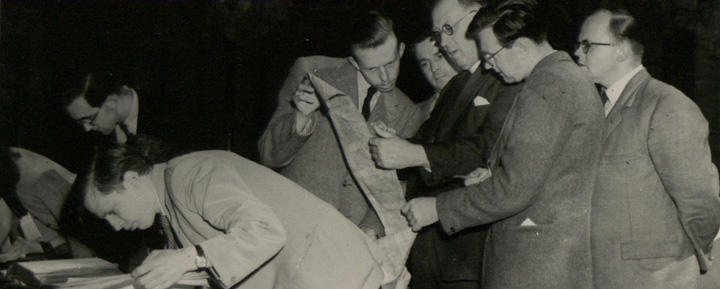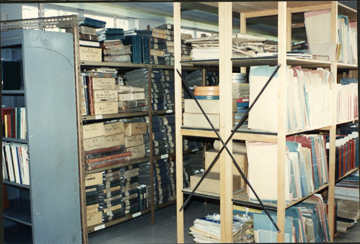Are we still just an archive for church records?

Students using the York Diocesan Archive during an archive summer school, c.1950
It is true to say that this is how we began. The Borthwick opened in 1953 to house the York Diocesan Archive - the archive of the Archbishop of York - which ranges in date from medieval times to the present day. This archive is an important resource for both ecclesiastical and social historians.
During the 1950s and 1960s the Borthwick saw itself almost exclusively as a specialist ecclesiastical archive and this role was strengthened by the arrival of further church archives: the Archbishop’s papers from Bishopthorpe Palace came in 1955, the Church Commissioners’ archive in 1957, the extensive York probate records (dating from the fourteenth century to 1858) arrived between 1958 and 1960 and accessions of parish records came in from the 1960s onwards.
A change began in the 1970s, when other types of archives began to be more readily accepted; at first these were regarded as ‘untypical’ of our holdings, but during the past three decades the variety of types of archives has expanded so much that it is now no longer true to say that the Borthwick is primarily an ecclesiastical archive, though it is still true that we specialise in particular areas.
Our policy is to accept archives which fit with the research interests of the University and we hold many nationally and internationally important archives.
These include a range of archives from non-Anglican churches, educational bodies and of charities, societies and associations.
Individual and family archives include that of the Earls of Halifax (the first Earl was Viceroy of India and Ambassador in Washington).
NHS archives in a temporary NHS store in 1995, just
before the move to the Borthwick
The first accession from the Retreat psychiatric hospital came in 1975, and in 1995 the York NHS archive was transferred, making the Borthwick a nationally significant holder of health and hospital records.
We hold business archives, including major holdings for York confectionery firms: the Rowntree archive came in in 1993 and Terry archive in 2005. We also hold archives for the Rowntree family.
The archives of the nationally important architectural practices of Walter Brierley and George Pace arrived in1990 and in 2008, which, with other archives, gives the Borthwick major holdings relating to architecture, craft and design, gardening and horticulture.
In more recent years new archives have been acquired covering other specialist areas. These include music, writing and performance (notable holdings include the archive of Alan Ayckbourn), the environment (for example, the Yorkshire Wildlife Trust) and social enterprise organisations (including Alcoholics Anonymous and the Joseph Rowntree Trusts).
For more information about our current holdings, please see:


